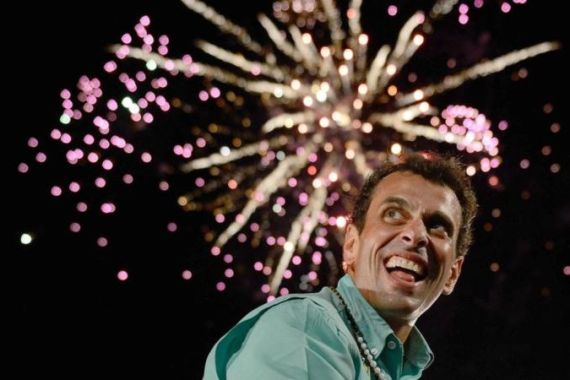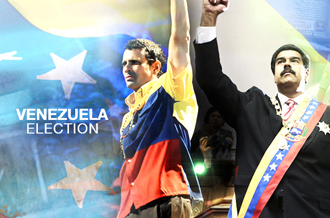Venezuela opposition tries to rebrand itself
Attempting to shed a reputation as representing elite interests, Henrique Capriles is cultivating a new approach.

Caracas, Venezuela – Hailing from a tough, working-class neighbourhood on the outskirts of Venezuela’s congested capital, Alejandra Diaz doesn’t fit the typical profile of a supporter of the country’s political opposition.
Support for deceased former president Hugo Chavez, and his anointed successor Nicolas Maduro, runs high in her Antimano suburb ahead of the April 14 presidential election, as the socialist government has doled out subsidised food, appliances, apartments and other benefits for poor residents.
But Diaz, a communications student and activist with the First Justice Party – part of the coalition supporting opposition candidate Henrique Capriles – has grown dissatisfied with the government and its rhetoric.
“The poor people had a bond with Chavez’s personality, as he identifies with the poor,” Diaz told Al Jazeera. “They went from having nothing, to having something.
 |
| Click here for all our in-depth content on the April 14 vote |
“But I know I won’t be able to get a job when I graduate [because of the government’s reported economic mismanagement] and it’s the worst feeling.”
Uphill battle
The opposition is campaigning hard, castigating the government performance, as well as growing insecurity and corruption. Venezuela has one of the highest inflation rates and the third highest murder rate in the western hemisphere, and its currency is likely to face another devaluation after the election. But polls point to an easy victory for the incumbent.
Maduro is at least ten percentage points ahead of Capriles – as the majority of lower-class Venezuelans say their lot has improved during 14 years of socialist governance.
“It’s going to be hard for the opposition to win,” Pedro Palma, a pro-opposition political analyst and economics professor, told Al Jazeera.
“One of the most criticised things Chavez did was to foster divisions: the poor against the rich,” Palma said. “But we don’t have seven million oligarchs here [roughly the number of people who supported the opposition in the previous election] and we don’t want to be fighting against each other.”
Despite appeals for national unity, many Venezuelans who aren’t entirely happy with the current state of affairs still do not trust the opposition, which has been historically linked with the elite. It’s an image Capriles’ team is trying to change – with mixed results.
|
|
| Campaigns wrap up ahead of key vote |
“Capriles believes it is possible to incorporate marginalised people into society, where they can build a productive, prosperous country with dignity,” Jorge Millan, a spokesman for the First Justice Party and head of Capriles’ campaign in Caracas, told Al Jazeera.
The previous election, in October 2012, saw the opposition make its biggest gains since 1998 – but it still lost by a margin of 10 percent, or more than one million votes.
Lack of trust
With a stunning view of the Caracas skyline from the wrap-around balcony of his mansion, Palma represents part of the image the opposition is trying to shake off.
His children are working in Europe and he seems like the sort of gentleman who would be more confortable in Miami or London than in the barrios of Caracas.
In a reality few here like to acknowledge, most – though certainly not all – opposition supporters have light skin and European descent, while government partisans tend to be from groups with African and indigenous ancestry.
“We, the people of the barrios, are now more visible and our opinions can be heard,” Brandon Medina, a government supporter living in a working-class community, told Al Jazeera.
“Before the poor couldn’t afford to go to school, now I am studying in a public university and my school fees are paid. Now we have a voice.”
The opposition has pledged to keep some of the social programmes initiated by the socialist government, but people such as Medina aren’t convinced by their claims.
Promising to champion the centre-left policies of former Brazilian President Ignacio Lula de Silva, Capriles has been unable to win support from the popular Workers’ Party leader. Lula, for his part, backs Venezuela’s Socialist Party, creating an awkward situation for Capriles.
Unfair advantages?
Rather than a battle of an entrenched, oil-soaked elite against a populist movement, the opposition portrays this election as a David versus Goliath battle for the soul of Venezuelan democracy, a battle in which they are the underdogs.
|
“The last election was not fair. The government has almost all the media on their side, they have been using state resources for their campaign, and the electoral authorities are partisan towards the government.“ – Jorge Millan, First Justice Party |
“The last election was not fair,” said Millan, the opposition campaign manager. “The government has almost all the media on their side, they have been using state resources for their campaign, and the electoral authorities are partisan towards the government.
“Democracy in Venezuela is in danger.”
Employees of state companies, including the oil giant PDVSA, are often required to attend pro-government rallies; their names are marked on a list when they leave buses sponsored by the company, although it isn’t uncommon for them to leave the rallies and head to shopping malls once they have signed the registration forms.
One woman, a housemaid who spoke on condition of anonymity, claims government supporters offered her a free “tummy-tuck” operation if she voted for the socialist party in the previous election. She took the free operation, a common procedure in a country where plastic surgery is popular, but said she still voted for the opposition. The system is, after all, based on secret balloting.
As much as opposition supporters loathe to admit it, Venezuela’s voting system has been described as one of the best in the world by observers such as the Carter Centre.
Personal attacks
Government supporters have been constantly mobilised since Chavez’s death on March 5, organising the funeral, major commemorations and other rallies. During some campaign events, supporters have seemed tired, while Capriles continues campaigning with intense energy.
In the October election, the opposition tried to take the high road, rallying around the slogan Hay un Camino or “there is a way” – criticising the government’s policies rather than focusing on Chavez himself. This time around, the gloves are off and the campaign has taken an aggressive, personal tone.
Maduro has insinuated that Capriles is homosexual, while the contender has called the incumbent a “liar”, blasting Maduro’s handling of Chavez’s health crisis.
Chavez was a savvy political operator, building connections with the disenfranchised and fostering emotional connections far more powerful than any policy plan or economic report. Maduro lacks that populist touch.
|
“The poor say they will vote for Maduro, but they don’t really connect with him. They are just going to vote for him because Chavez told them to, but Maduro doesn’t have the same charisma.” – Alejandra Diaz, student |
“The people have to believe that the government is working for them, Chavez was a master at that,” Palma said. “There is no question that Chavismo won’t be the same without Chavez.”
‘New consciousness’
With “El Comandante’s” death from cancer still fresh in the minds of voters, Maduro has consistently campaigned on the image of the departed leader, even referring to himself as a son of Chavez. For now, the rhetoric seems to be working, but opposition supporters believe the Cuban-educated bus driver will eventually falter.
“The poor say they will vote for Maduro, but they don’t really connect with him,” Diaz, the student from Antimano, said. “They are just going to vote for him because Chavez told them to, but Maduro doesn’t have the same charisma.”
The real test for the opposition is likely to come after this election, supporters admit privately. Without the unifying image of Chavez, the Socialist Party won’t be able to continue winning elections indefinitely, they believe. Eventually, day-to-day concerns such as inflation and crime will change voting patterns, opposition supporters say.
“The biggest legacy of the Chavez era will be social consciousness,” Palma said. “Politicians will have to be careful in handling the big majority of the population.”
If the polls are to be believed, attempts to gain votes from newly empowered Venezuelans will be a losing battle for the opposition, despite the myriad of social problems the country will have to face after election day.
Follow Chris Arsenault on Twitter: @AJEchris